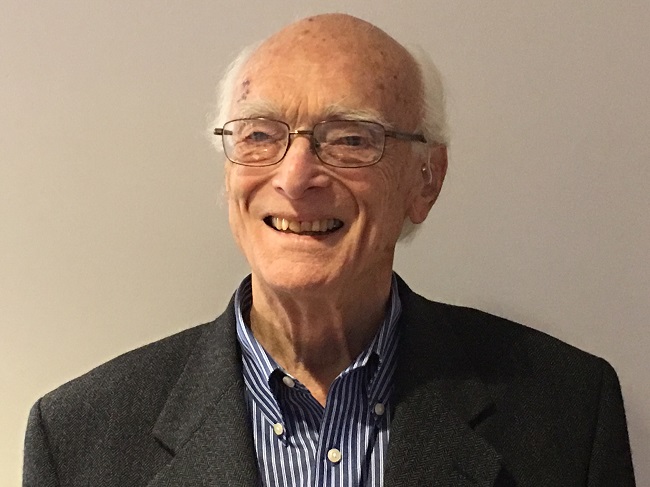
This article was first published in the National Post on May 27, 2023. It is being republished with permission.
by Tom Bradley
It’s not often you get a chance to talk to someone who’s been involved in a profession for more than 70 years. But the Vancouver investment community has such a person. Michael Ryan has been a pillar of insight, integrity and sound counsel since the early 1950s, and on June 1, the CFA Society Vancouver is launching an award in his honour: the Michael Ryan Award of Excellence.
Think about it. Ryan started out when luxury cars had fins, the Rolling Stones were in grade school and the NHL had six teams. His career provides a perspective on how things have changed, particularly regarding ethics and the availability of information, and how investing principles have remained the same.
Things were primitive back when he graduated from the University of British Columbia in 1952 with a degree in finance. His first job with a tiny brokerage firm, HJ Bird, lasted exactly a day, but he quickly got a job down the street at Hall Securities. Everything was done on paper and blackboards. Being near a ticker tape machine was a real edge. There was very little business reporting in the newspapers (the Financial Post was a weekly) and prospecting for new clients was done through the mail.
As Ryan recalls, brokerage firms were “a dime a dozen.” In Vancouver, there were “a few national (investment) houses and three local firms trying to do a job for individual investors, and 40 firms trying to do a job on investors.” Forbes magazine once called Vancouver the “Scam Capital of the World.”
Ryan had an analytical bent early on. He read the Wall Street Journal as a youngster and went “halfers” on a set of nine investment books from Barron’s with his school chum, Art Phillips, co-founder of Phillips, Hager & North. “We learned as we went,” he said.
He began doing security analysis when few others did. It was rare to talk to company management or even read an annual report. He tells the story of going to see a company and the CEO sliding the annual report across the table and grumbling, “Read this.” Ryan shocked him by saying he already had and had a question about one of the notes in the auditor’s report. “We became very good friends after that.”
We're not a bank.
Which means we don't have to communicate like one (phew!). Sign up for our Newsletter and Blog and join the thousands of other Canadians who appreciate the straight goods on investing.
In those days, investors got an edge by getting information nobody else had. Today, there are rules against that, and company information is a commodity. Investment results weren’t rigorously recorded, either. Few people knew what mutual funds were, and their results were reported once a year. Closed-end funds were more common.
Ryan made several other stops along the way, including setting up Ryan Investments, where he trained Murray Leith of Leith Wheeler Investment Counsel. He didn’t have a mentor himself, but mentored many industry notables including Leith, Bill Wheeler and Ken Shields.
Initially, his teachings were about security analysis and markets, but he became an invaluable consultant on management issues. “It was great having Mike around when there was a tough decision to make,” Wheeler said.
In the 1950s and ’60s, it was easier to differentiate your firm than it is today. Ryan Investments’ big edge was U.S. stocks. His small team had the U.S. market to themselves while everyone else was touting mining stocks.
Ryan also worked for Pemberton Securities twice (the second time after it bought his firm) and spent many years at Leith Wheeler. He was at the centre of some important investment milestones, most notably the creation of the Portfolio Management Foundation at UBC, which gives aspiring investors real money to manage and a professional committee to report to (many Canadian business schools have used the UBC template). In mid-May, he was bursting with pride when he told me the initial stake of $300,000 in 1986 had grown to more than $10 million.
A lot has changed during Ryan’s career, but his approach to investing is timeless. He believes you shouldn’t trust anything you can’t prove. “Most portfolio managers and analysts waste about 80 per cent of their time,” he said. “They’re looking at metrics and things that really aren’t that important.” He didn’t accept commonly accepted indicators unless he could prove them. “There are too many loose ideas around. You have to ask questions.”
Along the way, he developed a penchant for growth stocks, and learned from Phillips to pay attention to what is now called momentum. Phillips believed a majority of his holdings should be in uptrends. Ryan remembers him saying, “It doesn’t matter if I like the stock. What matters is that others like it.”
As is typical, Ryan is looking ahead, even at 93 years of age. He believes years from now people will be talking about how primitive our work on governance was. “Corporate governance is incredibly important, and we have very poor tools to get at it.” I think you’ll agree, he has the perspective to say that.

